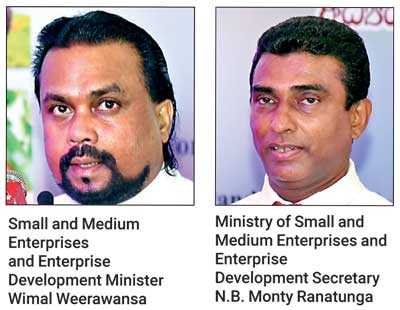Monday Feb 23, 2026
Monday Feb 23, 2026
Tuesday, 7 July 2020 01:10 - - {{hitsCtrl.values.hits}}
By Charumini de Silva
A nationwide survey has resulted in 15 key recommendations to boost Micro, Small and Medium Enterprises (MSMEs) post COVID-19 pandemic.
The recommendations follow a countrywide survey of nearly 3,000 MSMEs by the Small and Medium Business and Enterprise Development Ministry with academic inputs from Universities of Colombo, Peradeniya and Sabaragamuwa and consultancy facilitation from PASSAsia.
The recommendations include appointment of a MSME COVID-19 Relief Ombudsman, MSME support and care desk, MSME economic relief, MSME national database system, national MSME advisory and steering committee, solutions for COVID-19 unemployment, women economic empowerment and gender equality, national policy for industry raw materials, MSME virtual forum of Sri Lanka, sustainable agriculture and food security policy, review and support gig economy, MSME owners protection policy, cloud MSME Sri Lanka, national MSME development plan and use of new theories and models.
Greater coordination by all stakeholders comprising political authority, officials, business service providers, bankers and SMEs is also recommended as the way forward to boost the sector by the study titled ‘Impact of COVID-19 Pandemic on MSMEs in Sri Lanka’.
Small and Medium Business and Enterprise Development Minister Wimal Weerawansa yesterday welcomed the findings of the study and the new Government will take necessary measures to implement the recommendations in the medium term.
Small and Medium Business and Enterprise Development Ministry Secretary Monty Ranatunga said that MSMEs were the backbone of the economy, contributing to over 75% of total enterprises, 45% of employment and 52% of Gross Domestic Product (GDP) of the country.
The study shows that COVID-19 cost around 8.8% of GDP of the country within two months, with cash flow impasse and insufficient working capital being the key issues faced by MSMEs.
The minimum average working capital requirement forecasted for a MSME was around Rs. 9 million and this amount can be depicted as Rs. 1 million to Rs. 2 million for micro, Rs. 3 million to Rs. 5 million for small, Rs. 6 million to Rs. 8 million for medium and above Rs. 10 million for large-scale enterprises.
Noting that impacts of the COVID-19 pandemic were felt by businesses of all scale countrywide irrespective of districts, with over 80% of negative impact, Ranatunga said major and significant loss of employments were recorded both temporarily and permanently, while mostly affecting female MSMEs.
The study has also found that the commencement of lay-off or termination is rising due to lack of working capital to pay salaries. A percentage of 3.3% employment loss is shown in the survey sample and around 224,808 employment loss is forecasted for the country for two months.
As per the key findings, the study recommends to plan and implement immediate recommendations within 60 days, intermediate recommendations within six months and long-term recommendations within 36 months.
Accordingly, the Small and Medium Business and Enterprise Development Ministry must find ways and means to accelerate planning and implementation of these recommendations in order to ensure results and impact.
“It is recommended to prepare a long-term MSME economic development plan with a clear and accurate forecast to generate MSME income for the next three to five years in order to achieve targeted percentage contribution for the GDP. This will help the Government to receive COVID-19 relief investments back in rewards,” Ranatunga said.
Another recommendation is the MSME development plan for 2020-2023 which is to facilitate district level consultative meetings and produce a three-year rehabilitation and development plan for MSMEs in Sri Lanka.
“In line with this plan, the Government must strategically deal to recover the cash injected to MSMEs as COVID-19 economic relief. This is the best time for the Government to promote entrepreneurship in Sri Lanka,” the Secretary pointed out.
The Ministry Secretary also highlighted non-availability of an updated MSME database in Sri Lanka as the main limitation to introduce a probability sampling method. “Since there is no central database system among relevant agencies, the study had to use available data sources from diverse organisations belonging to different years and forecast of MSME losses was done using several assumptions,” he added.
The study was successfully concluded within 35 days with data collection provided by 2,924 personnel of both sexes representing all nine provinces, all 25 districts, all economic sectors, and all main ethnicities.
“Twenty-two MSME owners were facilitated with phone call-based interviews to gather qualitative data. Rapid and preliminary data analysis was completed with descriptive statistics and cross tabulations using Statistical Package for Social Sciences (SPSS). Therefore, this is the Rapid and Preliminary Draft Report (RPDR) as Version 1/May 2020. Findings are open for further advanced analysis, discussion, and verifications,” MSME Development Ministry Secretary Ranatunga said.
Pix by Ruwan Walpola